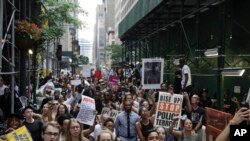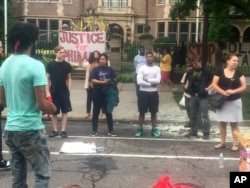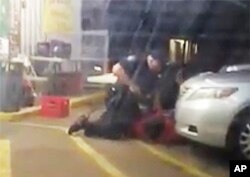Fatal police shootings in the U.S. of two African-American men in as many days are again raising questions about excessive police force, particularly against minorities.
Police say 32-year-old Philando Castile of nearby St. Paul was killed after a policeman pulled over the vehicle. They said the incident began when an officer initiated a traffic stop, but they have not further explained what led to the shooting. They said the officer involved has been placed on paid administrative leave, which is standard procedure in such cases.
Governor Mark Dayton said he does not believe Castile would have been treated that way if he had been white.
"All the facts aren't known, but from evidence that's been presented, the video that's been taken, nobody should be shot and killed in Minnesota for a traffic, a taillight being out of function. Nobody should be shot and killed while they are seated still in their car," said Dayton, who is white.
The state's Bureau of Criminal Apprehension has been called in to investigate.
What happened
A child and a woman were passengers in the car when Castile was killed. Shortly after the shots were fired, the woman began broadcasting video on her cellphone, streaming it live on her private Facebook account.
Castille was shown slumped in the car and bleeding profusely, with at least one officer pointing a gun through the driver's side window.
Obama's response
The shooting comes one day after police killed 37-year-old Alton Sterling in the southern city of Baton Rouge, Louisiana. Two white officers responding to a call about an armed man pinned Sterling to the ground when at least one officer shot him. The investigation into the shooting is being led by the U.S. Department of Justice's Civil Rights Division.
President Barack Obama said in a Facebook post that he is confident in law enforcers' ability to conduct thorough and fair investigations into the shootings, but he emphasized they are not isolated incidents.
"They are symptomatic of the broader challenges within our criminal justice system, the racial disparities that appear across the system year after year, and the resulting lack of trust that exists between law enforcement and too many of the communities they serve."
The problem, Obama said, does not contradict "our respect and appreciation for the vast majority of police officers who put their lives on the line to protect us every single day."
The president mentioned his two-year-old program, the Task Force on 21st Century Policing, as one effort to improve community policing, but emphasized the need for "communities to address the underlying fissures that lead to these incidents."
President and CEO of the NAACP William Brooks told VOA that the rights organization is pushing for the passage of several pieces of legislation, including comprehensive racial-profiling laws at the state and federal levels.
Amnesty International's Jamira Burley also stressed a re-examination of the law.
"The laws that govern when police can use lethal force need to be reformed and they need to be reformed now," Burley said. "Philando Castile should not have had to fear for his life during a traffic stop."
Samuel Walker, professor emeritus at the University of Nebraska and an expert on police accountability, told VOA, “There’s deep-seated racial prejudice” among some white Americans “and that plays out in police encounters.” Walker said some police officers have “an unconscious bias” that causes them into “reacting accordingly.”
“We’re really the prisoners of our history in this country,” Walker added.
With the proliferation of video recording devices, Walker said the United States is in the midst of “a digital revolution of policing” that is having a “tremendous effect” on the practice nationwide.
Mobile video impact
Although fatal police shootings go unabated, videos have had a “huge impact on public understanding of policing,” Walker said.
There have been 509 fatal police shootings in the United States in 2016 compared to 990 last year, according to a national database maintained by The Washington Post.
Continuous deadly force training in local police departments would help officers better handle encounters with the public, said Walker; but, such training is “hit or miss” due to the lack of national standards for the 15,000 separate local law enforcement agencies across the U.S.






